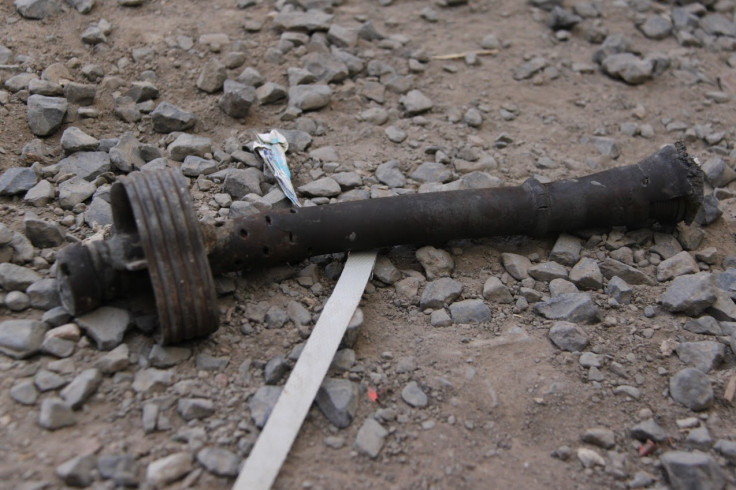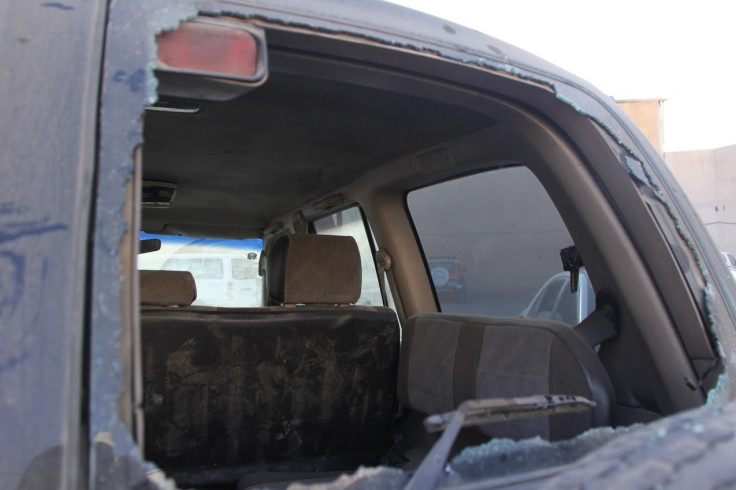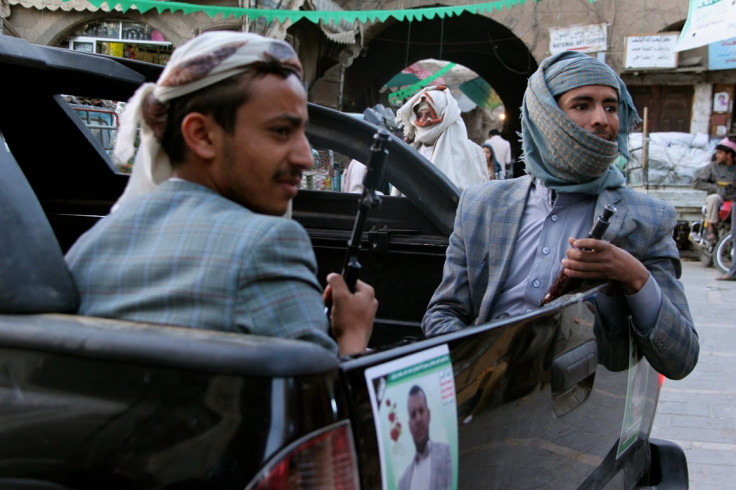Yemen crisis: Sanaa smoulders in ruins as country waits for Houthis' next move

With his neck and and right calf strapped in a white bandage, Assan Asali was petrified.
Asali, a waif-like figure, was among the 67 injured in last week's intensive clashes between the Shia Houthi rebels and the presidential guards in Yemen's capital, Sanaa.
When the 21-year-old left for his job in the car showroom in the morning, he didn't think he would wake up in hospital. Yet he was one of many innocent people injured in the clashes, along with three other showroom employees.
Two of the employees lost their legs and arms, and one was left in a critical condition after two shells unexpectedly struck the car showroom's backyard on 22 May Street, not far from the presidential palace.
Plumes of black smoke engulfed the sky, against the backdrop the of Al Nahdain mountains. Despite the chaos, employees arrived at work to secure the area around the showroom. "We didn't expect the shelling,"one said.
Remnants from the fighting could be seen five days after the clashes - bloody marks, a shattered vehicle, dented gas cylinder and holes in the guards cabin.
The fighting left local residents fleeing for their villages, unable to cope with the deafening sounds. Despite a ceasefire agreement, the gunfire did not stop.
Political instability has plagued Yemen since the revolution in 2011. With unemployment soaring to 54%, and 10 million people without food, experts believe the worst is still to come.
On Thursday evening (22 January), the prime minister and president resigned amid a standoff with the Shia rebels, pushing the country into greater chaos. An emergency meeting, called on Sunday to decide what to do about the president's resignation, was postponed. But a new date has yet to be announced.
'The president is not even in control of his house'
"When President Hadi came into power, we thought we would see some change. We thought he would pull us out of this poor economy, create jobs, and security. It's 10 times worse," said Nizam Nasher, Arabic language professor at the Centre for Arabic language and Eastern Studies in Old Sanaa.
Nasher said the president is not even in control of his house. "How can you expect him to look after the country? This should have happened a long time ago. He should have resigned before the Houthis came to Sanaa," he added.
The Houthi Shia rebels, also called 'Ansar Allah' or 'Partisans of God' occupied the capital on September 21, after four days of intensive clashes. Since then, the shiite group has rampaged through military buildings and state institutions.
On Monday 19 January, after a tussle with the presidential guards, the insurgent group seized the presidential palace and usurped the state television network Al Yemen, and Saba News agency.

Now it seems that the shiite rebels are firmly in control.
"Let's be honest, Houthis are in charge," said Abdo Elfgeeh, a Yemeni activist.
"Lets assume the good intentions of the new government, but they don't have enough power to implement their plans. We are a developing country and power is in the hand of the militia," he added.
'Long live the Yemeni people. No to Houthis'
Amidst the rising chaos, and government collapse, tens of thousands of protesters rallied across the country on 23 and 24 January.
"You see in the coming weeks, there will be more protests," said Nasher. "People are fed up."
"When President Hadi came into power, we thought we would see some change. We thought he would pull us out of this poor economy, create jobs, and security. It's 10 times worse."
"Long live the Yemeni people. No to Houthis," the crowd shouted, as young men and women thronged the streets from Sanaa University to the presidential palace
Many also chanted slogans against the former President Ali Abdullah Saleh, on whom the UN Security Council slapped sanctions for aiding the Houthis, and derailing the transition process. In some streets, there were even pro-Houthi demonstrators.
But what is actually going to happen to Yemen in the wake of last week's chaos?
Under Article 115, Yemen's constitution states, in the interim, powers should be transferred to the parliament speaker, Yahya al-Rai'i, member of Saleh's General People's Congress party. But experts warn Houthis are not one to relinquish control easily.
"The idea of a presidential or military council is not a top priority for the Houthis. The group is not keen to empower political parties like Islah and the General People's Congress," said Fernando Carvajal, a US-based Yemen analyst.
Hisham Al-Omeisy, an independent Yemeni analyst, said that Ansar Allah will be heavily influencing if not guiding the direction, regardless of a partnership agreement.
But not all Yemenis oppose the Shia rebels.
A coffee trader in Old city, on condition of anonymity said, the facilities are better since the Houthis took control.
Apart from the electricity, he said levels have security and protection have improved under the Shia rebels' dominance.

Al-Qaeda ready to take advantage?
With the power vaccum, analysts expect the issue of Southern independence to explode. Protests erupted in Taiz, Ibb, Hodeida, Mukalla and Aden, as the rebels tightened their grip on the capital. The southerners have long rejected the idea of control by the Shia rebels.
President Abd Rabu Mansur Hadi was a key ally of the US for approving the controversial drone strikes. Carvajal says challenges might now occur for the US in pursuing operations on the ground, and cooperating with the Yemeni intelligence.
Despite the turmoil, White House announced yesterday, it will continue drone strikes in the country. This has heightened the hostility among Yemenis who claim several innocent lives have been lost - 541 civilians were killed between 2002 and 2015.
A disconcerted Nasher said that while the US claims it is targeting militants, a young boy was reportedly killed in the first attack following the president's abdication.
One hope for the US is that the Houthis oppose Al-Qaeda, even if their slogan is 'Death to America.' However, at the same time Carvajal says: "Houthis do not want to give US the upper hand in security matters, and want to reverse the degree of independence given to the US by president Hadi."
Asaali's view is more simple, borne of frustration as well as the terror he was witnessed.
"I have no idea about the revolution, all these lies and political games" Asaali says.
"My only hope is for the state to be restored, so I can get on with my life with some stability and security."
Charlene Anne is a freelance journalist based in Sanaa who has written extensively about the Houthi insurgence.
© Copyright IBTimes 2025. All rights reserved.





















